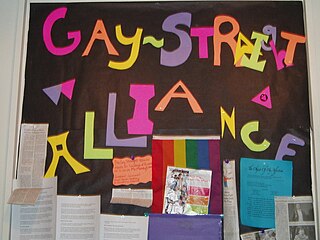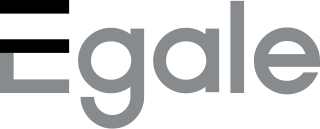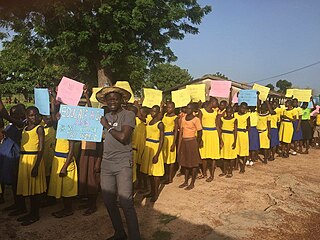Related Research Articles

Title IX is a landmark federal civil rights law in the United States that was enacted as part of the Education Amendments of 1972. It prohibits sex-based discrimination in any school or any other education program that receives funding from the federal government. This is Public Law No. 92‑318, 86 Stat. 235, codified at 20 U.S.C. §§ 1681–1688.

Bloomington is a city in and the county seat of Monroe County, Indiana, United States. The population was 79,168 at the 2020 census. It is the seventh-most populous city in Indiana and the fourth-most populous outside the Indianapolis metropolitan area. It is the home of Indiana University Bloomington, the flagship campus of the Indiana University system. Established in 1820, IU Bloomington enrolls over 45,000 students.
GLSEN is an American education organization working to end discrimination, harassment, and bullying based on sexual orientation, gender identity and gender expression and to prompt LGBT cultural inclusion and awareness in K-12 schools. Founded in 1990 in Boston, Massachusetts, the organization is now headquartered in New York City and has an office of public policy based in Washington, D.C.

A gay–straight alliance, gender–sexuality alliance (GSA) or queer–straight alliance (QSA) is a student-led or community-based organization, found in middle schools, high schools, colleges, and universities. These are primarily in the United States and Canada. Gay–straight alliance is intended to provide a safe and supportive environment for lesbian, gay, bisexual, transgender, and all LGBTQ+ individuals, children, teenagers, and youth as well as their cisgender heterosexual allies. The first GSAs were established in the 1980s. Scientific studies show that GSAs have positive academic, health, and social impacts on schoolchildren of a minority sexual orientation and/or gender identity. Numerous judicial decisions in United States federal and state court jurisdictions have upheld the establishment of GSAs in schools, and the right to use that name for them.

Egale Canada is a Canadian charity founded in 1986 by Les McAfee to advance equality for Canadian lesbian, gay, bisexual and transgender (LGBTQ) people and their families, across Canada.

Taiwan Tongzhi Hotline Association is an organization that provides the LGBT community with peer counseling, support networks, and a community resource center. It is the first LGBT non-governmental organization (NGO) registered in Taiwan.

Canadian lesbian, gay, bisexual, transgender, and queer (LGBTQ) rights are some of the most extensive in the world. Same-sex sexual activity, in private between consenting adults, was decriminalized in Canada on June 27, 1969, when the Criminal Law Amendment Act, 1968–69 was brought into force upon royal assent. In a landmark decision in 1995, Egan v Canada, the Supreme Court of Canada held that sexual orientation is constitutionally protected under the equality clause of the Canadian Charter of Rights and Freedoms. In 2005, Canada became the fourth country in the world, and the first in the Americas to legalize same-sex marriage. In 2022, Canada was the third country in the world, and the first in North America, to fully ban conversion therapy nationwide for both minors and adults.
Richland-Bean Blossom Community School Corporation (RBB) is a public school corporation located in northwestern Monroe County, Indiana, USA. RBB and Monroe County Community School Corporation are the only two school corporations serving the county. RBB serves Ellettsville, Stinesville, Beanblossom Township, and Richland Township. The Richland-Bean Blossom Metropolitan School District was formed in 1963 and became the Richland-Bean Blossom Community School Corporation in 1965. The district is accredited by AdvancED.

Inclusion in education refers to including all students to equal access to equal opportunities of education and learning, and is distinct from educational equality or educational equity. It arose in the context of special education with an individualized education program or 504 plan, and is built on the notion that it is more effective for students with special needs to have the said mixed experience for them to be more successful in social interactions leading to further success in life. The philosophy behind the implementation of the inclusion model does not prioritize, but still provides for the utilization of special classrooms and special schools for the education of students with disabilities. Inclusive education models are brought into force by educational administrators with the intention of moving away from seclusion models of special education to the fullest extent practical, the idea being that it is to the social benefit of general education students and special education students alike, with the more able students serving as peer models and those less able serving as motivation for general education students to learn empathy.
Mansfield Independent School District is a school district headquartered in Mansfield, Texas, United States.
The Anoka-Hennepin School District 11 is a school district in Minnesota, northwest of Minneapolis and Saint Paul. The district serves 13 communities: All of Anoka, Champlin and Coon Rapids, and parts of Andover, Blaine, Brooklyn Center, Brooklyn Park, Dayton, Fridley, Ham Lake, Nowthen, Oak Grove and Ramsey. The district's name refers to its geographic span over two counties: it covers the southern portion of Anoka County and the northeast part of Hennepin County. The district was formed in 1920 and in 1952 after dozens of small rural school districts voted to consolidate.

Richland Township is one of eleven townships in Monroe County, Indiana, United States. As of the 2020 census, its population was 15,098, and it contained 6,455 housing units.

Bloomington Academy is a high school in Bloomington, Indiana, United States which utilizes Project Based Learning. It is a part of the Monroe County Community School Corporation. The Academy opened in fall 2008 with a class size of 96 students, the school serves students in 9th-12th grades, and at the beginning, added a class each year, with up to 100 students per grade. In May 2009, the class of 2012 had 50-65 students, and 58 Students graduated in the class of 2012. The school has a 1:1 student to computer ratio. While this was remarkable at the creation of the school it has since become the standard across MCCSC.

Lesbian, gay, bisexual, transgender, and queer (LGBTQ) rights in the U.S. state of Indiana have been shaped by both state and federal law. These evolved from harsh penalties established early in the state's history to the decriminalization of same-sex activity in 1977 and the legalization of same-sex marriage in 2014. Indiana was subject to an April 2017 federal court ruling that discrimination based on sexual orientation is tantamount to discrimination on account of "sex", as defined by the Civil Rights Act of 1964. The ruling establishes sexual orientation as a protected characteristic in the workplace, forbidding unfair discrimination, although Indiana state statutes do not include sexual orientation or gender identity among its categories of discrimination.

Historically speaking, lesbian, gay, bisexual, transgender and queer (LGBTQ) people have not been given equal treatment and rights by both governmental actions and society's general opinion. Much of the intolerance for LGBTQ individuals come from lack of education around the LGBTQ community, and contributes to the stigma that results in same-sex marriage being legal in few countries (31) and persistence of discrimination, such as in the workplace.

LGBT employment discrimination in the United States is illegal under Title VII of the Civil Rights Act of 1964; employment discrimination on the basis of sexual orientation or gender identity is encompassed by the law's prohibition of employment discrimination on the basis of sex. Prior to the landmark cases Bostock v. Clayton County and R.G. & G.R. Harris Funeral Homes Inc. v. Equal Employment Opportunity Commission (2020), employment protections for LGBT people were patchwork; several states and localities explicitly prohibit harassment and bias in employment decisions on the basis of sexual orientation and/or gender identity, although some only cover public employees. Prior to the Bostock decision, the Equal Employment Opportunity Commission (EEOC) interpreted Title VII to cover LGBT employees; the EEOC determined that transgender employees were protected under Title VII in 2012, and extended the protection to encompass sexual orientation in 2015.
Title IX of the United States Education Amendments of 1972 prohibits discrimination "on the basis of sex" in educational programs and activities that receive financial assistance from the federal government. The Obama administration interpreted Title IX to cover discrimination on the basis of assigned sex, gender identity, and transgender status. The Trump administration determined that the question of access to sex-segregated facilities should be left to the states and local school districts to decide. The validity of the executive's position is being tested in the federal courts.
Education sector responses to LGBT violence addresses the ways in which education systems work to create safe learning environments for LGBT students. Overall, education sector responses tend to focus on homophobia and violence linked to sexual orientation and gender identity/expression, and less on transphobia. Most responses focus in some way on diverse expressions of gender and support students to understand that gender may be expressed in a different way from binary models. Responses vary greatly in their scope ; duration ; and level of support that they enjoy.
The social policy of the Joe Biden administration is intended to improve racial equity, increase access to safe and legal abortions, tighten restrictions on gun sales, among other aims. A number of policies aim to reverse the former policies of President Donald Trump, including the "Muslim" travel ban and loosened anti-discriminatory policies relating to LGBT people.
References
- ↑ "List-of-Public-School-Numbers-3-21.pdf" (PDF). State of Indiana. Retrieved November 15, 2024.
- ↑ "Monroe County Community School Corporation Board of School Trustees 2024". Monroe County Community School Corporation. Retrieved November 15, 2024.
- ↑ "MCCSC Research Requests". Indiana University. Retrieved November 15, 2024.
- ↑ "IN SB0185". State of Indiana. Retrieved November 21, 2024.
- ↑ "WIRELESS COMMUNICATION DEVICES". Monroe County Community School Corporation. Retrieved November 15, 2024.
- ↑ "ANTI-RACISM". Monroe County Community School Corporation. Retrieved November 20, 2024.
- ↑ "EQUITY-CENTERED SEXUAL IDENTITY AND GENDER INCLUSIVE POLICY". Monroe County Community School Corporation. Retrieved November 20, 2024.